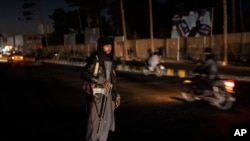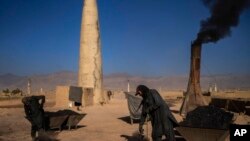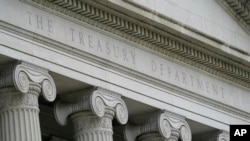The Taliban's return to power in Afghanistan last August and the humanitarian crisis that followed have confronted the Biden administration with a dilemma: How to keep the flow of international assistance into a country facing mass hunger while ensuring the aid money does not enrich Taliban and Haqqani Network leaders?
The answer has wide implications, not just for easing the suffering of more than 35 million Afghans but also for international efforts to get the militant group to moderate policies seen by many as harsh, even brutal.
"It is an almost impossible needle to thread," said Jordan Strauss, a managing director at risk consulting firm Kroll, who worked as a Justice Department official in Afghanistan from 2014 to 2015.
When the Taliban seized Kabul, wide-ranging sanctions dating back to their first rule followed them. To deny them access to funds, the Biden administration then froze more than $7 billion in Afghan government reserves held in the Federal Reserve Bank of New York.
The asset freeze exacerbated a simmering economic crisis.
“The absence of a functioning banking sector and risk of economic collapse continue to pose obstacles to mounting the scale of response needed to prevent a humanitarian crisis,” Bernice G. Romero, executive director of the Norwegian Refugee Council (NRC), told VOA.
Under pressure from aid groups, the Biden administration issued sanctions exemptions in September and December.
This has allowed nonprofit organizations to deliver food and other assistance into Afghanistan. But many aid groups, NGOs and banks remain wary of violating U.S. sanctions, according to NGO officials.
To reassure them they won't be penalized for doing humanitarian work, Treasury officials have met with representatives of non-profit organizations in recent months.
Last week, Under Secretary of Treasury Brian Nelson spoke with NGO leaders to highlight a new list of Frequently Asked Questions "designed to provide clarity and further facilitate humanitarian aid and commercial activity in Afghanistan"
Here is a look at current U.S. sanctions and exemptions:
What sanctions are currently in place against the Taliban?
U.S. economic sanctions against the Taliban date back to their first time in power in the 1990s. The curbs were tightened after the attacks of September 11, 2001, which prompted the U.S. to invade Afghanistan.
Under an executive order issued just days after the attack by then-President George W. Bush, both the Taliban and the Haqqani Network were labeled Specially Designated Global Terrorists (SDGTs).
The designations allowed U.S. authorities to block and seize the assets of the two militant groups, while making it a crime to do business with them.
With the Taliban now the de facto government of Afghanistan, it remains unclear whether the 20-year-old restrictions apply to their current regime or only to individual officials previously named under U.S. sanctions.
"It needs to be clarified," Strauss said.
Asked whether the sanctions apply to the Taliban government or individual Taliban officials, a Treasury Department spokesperson noted that both the Taliban and the Haqqani Network are Specially Designated Global Terrorists, adding that the Haqqani Group also is designated ad a Foreign Terrorist Organization.
She did not elaborate.
What exemptions have been issued by the Treasury Department?
Concerned the sanctions were impeding the flow of aid into Afghanistan, the Treasury Department has carved out broad exemptions for NGOs and other organizations working in Afghanistan.
Since September, the Treasury Department has issued six "general licenses" — essentially permits to carry out activities otherwise prohibited under U.S. sanctions.
These licenses allow international organizations to deliver food and agricultural produce, support public hospitals and pay the salaries of teachers and healthcare workers. They also authorize banks to process transactions related to these activities without being punished.
For example, a U.S. company can ship food to Afghanistan, and a U.S.-based bank can carry out financial transactions to facilitate the shipment. Neither would face any penalties, according to the Treasury Department website.
The latest Treasury Department license, issued on December 19, goes further, allowing NGOs to conduct a broad range of activities that fall outside traditional humanitarian work, such as supporting human rights, access to information and government transparency.
Even as some Taliban and Haqqani Network officials remain subject to U.S. sanctions, NGOs and other organizations are now allowed to work with them, an inevitable consequence of the change in government in Kabul.
For example, a nonprofit may enter into a memorandum of understanding with Taliban officials to coordinate the delivery of aid, provide descriptions of their projects and share office space, according to the Treasury website.
NGOs are also permitted to pay taxes, dues and import duties to the Taliban, the Haqqani Network and entities they control, as long as the payments are related to the authorized activities.
What the licenses don't allow
While allowing NGOs and others to work with the Taliban and Haqqani Network, the Treasury Department licenses prohibit the transfer of funds to officials who remain under U.S. sanctions.
Despite Treasury's assurances, some commercial players are not taking their chances.
Crowdfunding giant GoFundMe recently reportedly suspended an Afghan journalist's campaign to raise funds for his struggling news site.
The Treasury Department spokesperson said crowdfunding platforms can allow individual fundraisers "so long as transactions or activities do not involve sanctioned individuals, entities, or property in which sanctioned individuals and entities have an interest."
GoFundMe did not respond to a request for comment.







